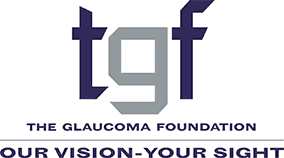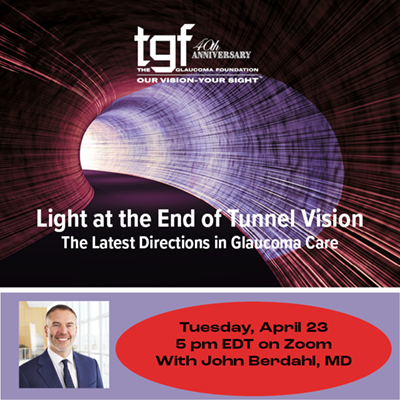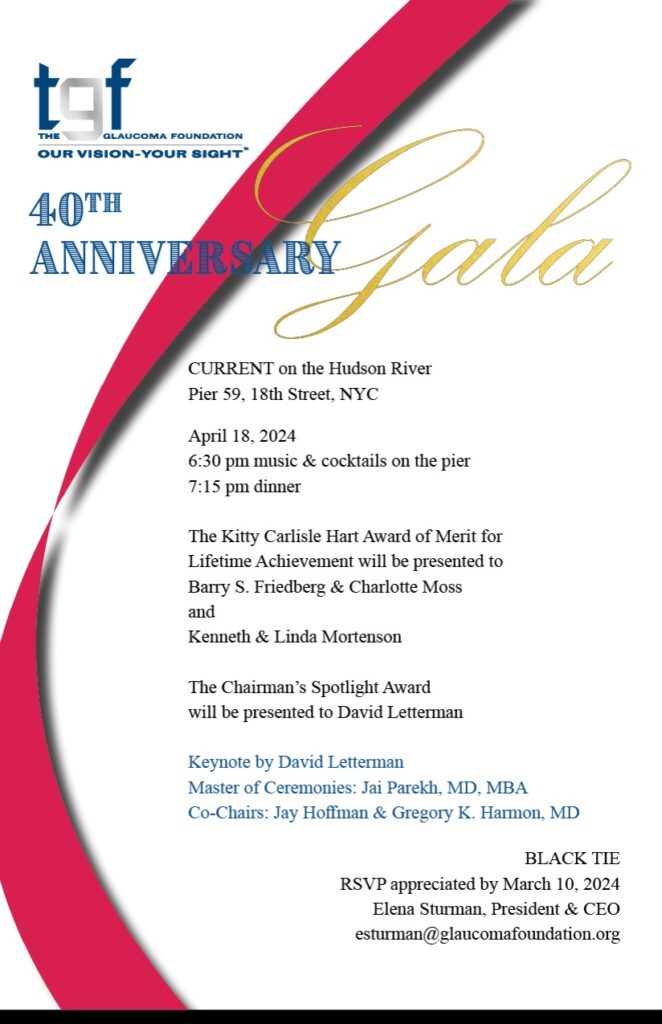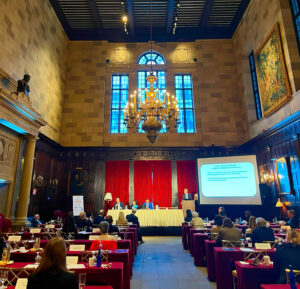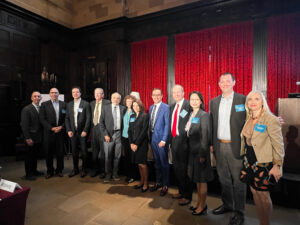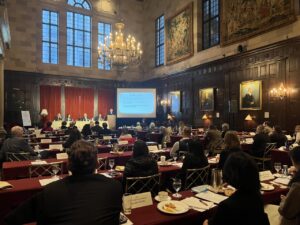Check here to see our upcoming events and videos from past events.
"The Value of a Fellowship"
The Glaucoma Foundation provides annual supplemental fellowship grants to women and minority physicians to support their research and professional development. In this fireside chat, TGF president and CEO Elena Sturman talks to 2022 fellowship recipient Dr. Jose Quiroz and his mentor Dr. Avnish Deobhakta about why awards like this are so valuable.
"Light at the End of Tunnel Vision: The Latest Directions in Glaucoma Care"
Therapies for Glaucoma are safer, more effective, and more tailored to the patient’s needs than ever before. We will discuss updates in Surgical Technologies, Drugs and New Drug Delivery, New Lasers, and what is just around the corner. Together let’s shed light on glaucoma therapies to help stop tunnel vision.
"TGF's 40th Anniversary Gala"
On Thursday, April 18, TGF will celebrate 40 years. To commemorate this milestone, we’re throwing a black-tie benefit gala in New York City.
Television host, comedian, writer, and producer David Letterman will receive TGF’s inaugural Chairman’s Spotlight Award.
Barry S. Friedberg & Charlotte Moss, and Kenneth & Linda Mortenson will receive TGF’s annual Kitty Carlisle Hart Award of Merit for Lifetime Achievement.
Keynote by David Letterman
Master of Ceremonies, Jai Parekh, MD, MBA
Co-Chairs, Jay Hoffman and Gregory K. Harmon, MD
"TGF Featured on Health Uncensored with Dr. Drew"
On Sunday, January 28th The Glaucoma Foundation was featured on the debut episode of media personality Dr. Drew Pinksy’s show titled “Health Uncensored with Dr. Drew.” TGF President and CEO Elena Sturman was interviewed by Dr. Drew and TGF grant recipient Thomas V. Johnson III, MD, PhD from Johns Hopkins spoke about his exciting research.
Please enjoy this insightful webinar titled ‘I’ve Been Diagnosed with Glaucoma. Now What?’ This program is tailored to guide individuals navigating a glaucoma diagnosis, offering a comprehensive discussion on pivotal topics. From unveiling the hallmarks of good glaucoma care and effective doctor-patient collaboration strategies to actionable steps for managing vision loss, attendees will gain valuable insights. Learn about the essential questions to ask your doctor, discover impactful lifestyle adjustments, and explore the critical need for emotional and psychological support in this empowering session.
Dr. Constance Okeke, MD, MSCE, is a renowned cataract surgeon and a pioneer in micro-invasive glaucoma surgery (MIGS) with Ivy-League training. Dr. Okeke serves as the Lead Glaucoma Specialist at Virginia Eye Consultants, an Assistant Professor of Ophthalmology at Eastern Virginia Medical School, and actively contributes to clinical research, peer-to-peer education, and publications in esteemed ophthalmology journals. Her dedication to patient education is evident through her AGE Initiative, Advocates for Glaucoma Education, where the foundational resource is her most recent book, “The Glaucoma Guidebook” – A Johns Hopkins Health Book, which won the Best Book Award from the American Book Fest. Her accomplishments have earned her recognition on The Ophthalmologist’s Global Power List for 2021 and 2022.
"Insights into Glaucoma and Women's Health: Exploring the Impact of Menopause and Visual Function"
Glaucoma is the leading cause of irreversible blindness worldwide. 59% of glaucoma patients are female; therefore, it is worthwhile to understand if there are associations between female reproductive factors and glaucoma. Dr. Andrew Feola’s group focuses on understanding how menopause and estrogen play a role in risk factors related to the onset of glaucoma and visual function.
In this webinar, he discusses his ongoing preclinical work of glaucoma and menopause and explore the clinical association between the onset of menopause and glaucoma.
"TGF's 28th Annual Scientific Think Tank"
The Glaucoma Foundation Annual Think Tank convenes experts, from diverse fields, and from across the country and around the world, to share their insights and chart the course for future research that will lead to better treatments on our way to a cure.
SESSION 1: Glaucoma Data Integration – Moderator, Louis R. Pasquale, MD
0:00 Welcome and Introduction – Louis R. Pasquale, MD, FARVO
0:03:53 Sally Baxter, MD Intro
0:05:56 Overview of Databases Available to Advance Glaucoma Knowledge – Sally Baxter, MD
0:18:05 Anthony Khawaja, MD Intro
0:19:38 Lessons Learned About Glaucoma from the UK Biobank – Anthony Khawaja, MD
0:41:51 Stuart MacGregor, PhD Intro
0:43:28 POAG Genomic Architecture Update – Stuart MacGregor, PhD
01:09:49 Audience Questions
SESSION 2: Drug Re-Purposing in Glaucoma – Moderator, Richard K. Lee, MD, PhD
0:00 Introduction – Richard K. Lee, MD, PhD
0:00:45 Insulin Signaling and Glaucoma – Louis R. Pasquale, MD
0:17:02 Metformin and Glaucoma – Joshua Stein, MD
0:42:03 GLP-1R Agonists and Glaucoma – Qi Cui, MD, PhD
1:10:27 Metformin (Study in LC Cells) – Colm O’Brien, FRCS, MD
1:15:12 Audience Questions
SESSION 3: Neuroprotection – Moderator, Robert N. Weinreb, MD
0:00 Introduction – Robert N. Weinreb, MD
00:01:47 Overview of Glaucoma Neuroprotection Agents – Derek Welsbie, MD
00:23:27 Why Do We Not Have Glaucoma Neuroprotection? – Robert N. Weinreb, MD
00:54:24 Facilitating Randomized Clinical Trials in Neuroprotection Through Artificial Intelligence: An Emerging Paradigm – Felipe Medeiros, MD, PhD
01:20:00 Audience Questions
SESSION 4: Sex Hormones and Glaucoma, Moderator, Rachel Lee, MD MPH
0:00 Introduction – Rachel Lee, MD MPH
00:00:41 The Role of Sex Hormones in the Pathogenesis of Open-Angle Glaucoma: Evidence from Epidemiological Studies – Thasarat Vajaranant, MD, MHA
00:27:54 Estrogen Signaling Pathways in Glaucoma – Yutao Liu, PhD
00:49:58 The Biomechanical Argument that Estrogen Plays a Role in Glaucoma – Andrew Feola, PhD 01:10:10 Audience Questions
SESSION 5: Non-IOP Factors of Importance in Glaucoma, Moderator, Jeffrey M. Liebmann, MD
0:00 Introduction – Jeffrey M. Liebmann, MD
0:01:20 Diet and Glaucoma – Jae Hee Kang, ScD
0:36:00 Hypertension, Antihypertensive Drugs and Glaucoma – Alon Harris, PhD
01:11:20 The Impact of Glaucoma on Activities of Daily Living – Pradeep Ramulu, MD
01:37:37 Audience Questions
SESSION 6: What Can TGF do to Help Patients, Researchers, and Eyecare Providers Tackle Glaucoma? Co-Moderators: Louis R. Pasquale, MD and Gregory K. Harmon, MD
0:00 Introduction – Gregory K. Harmon, MD
0:02:34 What is The Glaucoma Foundation Doing Now? – Elena Sturman
0:16:00 What Do Patients Want To See In Glaucoma Research?
0:16:34 Jahkori Dopwell Hall
0:25:22 Hillary Golden
0:33:04 Amy Dixon
0:45:48 Audience Questions
"How to Save the Sight of Patients with Glaucoma While Minimizing Adverse Reaction from Eye Drops"
For patients with glaucoma, the fact that their disease can be slowed down with pressure-lowering eye drops is unquestionably a good thing. But is there enough focus on the unwanted side effects that come with the daily application of one or more eye drops?
This presentation will focus on the ocular surface discomfort that far too many glaucoma patients suffer from. In addition, examples will be given of ways in which ophthalmologists can stratify the treatments to minimize the individual patient’s adverse effects. All to improve both adherence and quality of life in the growing glaucoma population.
"The Body-Eye Relationship"
Nearly half of American adults have high blood pressure. The interaction between various blood pressure parameters and glaucoma has been the subject of intense investigation for decades.
How is systemic blood pressure related to glaucoma?
What effect do blood pressure medications have on blood flow and intraocular pressure?
And how do artificial intelligence and mathematical models help in this research?
In this webinar, Prof. Alon Harris speaks about the body-eye relationship, focusing on glaucoma, technology, and math.
"Future Prospects for Restoring Vision in Patients with Glaucoma: The Promise of Optic Nerve Regeneration"
"What do cold hands have to do with glaucoma?"
Learn about Flammer’s Syndrome with Josef Flammer, MD and patient Hillary Golden
In 2020, Hillary Golden went to see an optometrist to treat a stye. She was completely surprised when the doctor was more concerned about her optic nerve. She was diagnosed with normal tension glaucoma (NTG). Hillary had lost a good amount of visual field already and was immediately referred to a glaucoma specialist. While researching NTG, she kept coming across something called Flammer Syndrome. She fit the patient profile, so she read study after study to learn more. This led her to reach out to Dr. Josef Flammer, whom the syndrome was monikered after, to gather more information. She sent an email, not expecting a reply, and was delighted when she heard back from Dr. Flammer himself.
Hillary speaks publicly about her diagnosis, how glaucoma affects patients in everyday life, and how she manages her disease. Her career has included sales and training of medical devices, imaging equipment, and computer guided surgical navigation. She is currently a clinical consultant in the glaucoma space.
Dr. Josef Flammer is a Swiss ophthalmologist with a specialty in glaucoma. He is an emeritus director of the Eye Clinic at Basel University Hospital. Dr. Flammer was one of the first researchers to demonstrate systemic side effects of locally administered beta-blockers (i.e. eye drops) in ophthalmology. He and his collaborators found that intraocular pressure variation is as important for the development of glaucoma as a constantly elevated intraocular pressure – long considered the main, if not the only, cause of glaucoma. In numerous research projects, he demonstrated that glaucoma could be caused by a dysregulation of ocular blood flow, even at normal levels of intraocular pressure. Flammer discovered that vasospasms in the eye are a manifestation of a general vasospastic syndrome. Later, he noted that such spasms are only the tip of the iceberg and an indication of a much more generalized vascular dysregulation in the human body, increasing the risk of eye disease, particularly of normal tension glaucoma. Dr. Flammer noted that people with primary vascular dysregulation have other symptoms and signs, leading to the establishment of the term Flammer Syndrome. Among many other discoveries, he also demonstrated the relationship between eye disease and heart disease.At the Basel Eye Clinic, Dr. Flammer initiated one of the most renowned annual conferences for ophthalmologists in Europe, the Basel Ophthalmo Meeting. In addition to hundreds of original papers, he is the author of “Glaucoma,” a book intended for the general public which has so far been published in 22 languages. It is considered the world’s most widely used non-fiction book on this ocular disease.
"Start With The Young: A Glaucoma Education Pilot Program"
This initiative to raise awareness, starting with young, is a virtual program presented by Dr. Jose Quiroz, one of the three most recent recipients of the TGF (Sponsored by Patricia Hill)-RBP Fellowship in Glaucoma and Research Fellow at New York Eye and Ear- Mount Sinai. We are grateful to Ms. Hill for her sponsorship, Dr. Quiroz for his advocacy and expertise, and the STEM Institute at CCNY for helping us reach several hundred middle and high school students and their parents representing communities (northern Harlem, Washington Heights, and Inwood) with high African American and Hispanic heritage – communities at high risk for glaucoma.
"Glaucoma & Your Lifestyle - Health, Habits, Happiness"
Glaucoma patients often wonder what more they can do for their glaucoma and optic nerve health in addition to the treatments prescribed by their eye-care providers. In this webinar, Dr. Aakriti Shukla discusses and debunks a variety of lifestyle recommendations for glaucoma.
Aakriti Shukla, MD is the Leonard A. Lauder Assistant Professor of Ophthalmology at Columbia University Irving Medical Center in NY, NY. Her research interests include structure-function relationships in glaucoma, optimization of surgical outcomes, and sustainability in ophthalmology.
"Low-Vision Devices for Everyday Life"
Steven Schoenbart, OD addresses the various ways to educate and assist patients who suffer from vision loss, including the use of telescopic glasses for “hands free” magnification.
"The Future is Now: Translating New Information into Clinical Practice"
This symposium held at the Harvard Club in NYC, provided a unique opportunity for ophthalmologists and optometrists to explore together the future of diagnosis and treatment.
"Remote IOP Monitoring: Lessons Learned from a Doctor and a Patient"
Dr. Barbara Wirostko FARVO and glaucoma patient Rebecca Vilender talk about the benefits of measuring your IOP at home, and how you can access an affordable home-monitoring device.
Glaucoma is a chronic disease that requires chronic monitoring. IOP monitoring is most often based on measurements taken during clinic visits, necessarily occurring at a specific day and time during business hours, often months apart. However, IOP can vary throughout the day and night; spot measurements cannot capture its fluctuations.
Knowing this, many physicians want to monitor IOP at various times. The iCare Home offers a tonometer (an instrument for measuring pressure) that can be easily used by patients outside of their doctor’s office hours. Physicians report that, for some patients, the iCare Home tonometer has detected dramatic and potentially dangerous spikes in IOP that they did not capture during office visits. Detecting these IOP spikes, prior to progression, may enable earlier intervention, more accurate treatment, and better outcomes.
Now, you can rent or buy an affordable iCare Home tonometer with a prescription from your physician. Dr. Barbara Wirostko, founder of MyEyes, will talk about the process, and a patient who has used the iCare Home will demonstrate its use and tell us how she benefitted from monitoring her IOP throught the day.
"Navigating the Psycho/Social Aspects of Glaucoma"
The psycho-social issues of glaucoma that so dramatically affect a patient’s quality of life are rarely addressed in glaucoma care as they have been in other medical situations such as AIDS, cancers and Alzheimers.How can glaucoma affect your professional and personal life? How does stress impact glaucoma? What techniques can reduce anxiety? What should you look for in a therapist? Glaucoma patient Joe Lovett and psychologist Deborah Waxenberg explore these and other questions about living with glaucoma.
"Harnessing Artificial Intelligence to Improve Glaucoma Management: Challenges & Opportunities"
How will artificial intelligence improve glaucoma care?
How can AI support clinicians in the treatment of their glaucoma patients?
What are the challenges in implementing appropriate AI systems in clinical practice?
This webinar will provide basic information about artificial intelligence (AI) in ophthalmology, and an overview of the latest developments in the use of AI to automate and improve the management of glaucoma.
Dr. Zangwill’s presentation will highlight the opportunities for providing real-time AI decision support to clinicians treating glaucoma patients, as well as the challenges in implementing appropriate AI systems in clinical practice.
Linda Zangwill, Ph.D., Professor of Ophthalmology at the University of California San Diego serves as Director of Clinical Research of the Hamilton Glaucoma Center, and Director of the Imaging Data Evaluation and Analysis Reading Center. Dr. Zangwill has published over 350 manuscripts in peer-reviewed journals. She is an elected executive committee member of the Glaucoma Research Society and is an Association for Research in Vision and Ophthalmology Gold Fellow.
Dr. Zangwill has been continuously funded by the National Eye Institute for 25 years as Principal Investigator for the Diagnostic Innovations in Glaucoma Study (DIGS) and more recently, the African Descent and Glaucoma Evaluation Study (ADAGES). Dr. Zangwill’s clinical research focuses on improving our understanding of the complex relationship between structural and functional change over time in the aging and glaucoma eye, developing computational and machine learning techniques to improve glaucoma detection, developing methods to differentiate between highly myopic eyes with and without glaucoma, and identifying risk factors that can predict rapidly progressing glaucoma.
"Glaucoma: Seeing the Light at the End of the (Nano)Tunnel"
At the lab of Dr. Adriana Di Polo at University of Montreal, researchers are paving the way for the development of therapeutic approaches to protect pericytes and their nanotubes. The goal? Restoring vascular health and vision in glaucoma.
In living animals, as in humans, the retina uses the oxygen and nutrients contained in the blood to function properly. This vital exchange takes place through capillaries, the thinnest blood vessels in all organs of the body. Pericytes are small cells that wrap around capillaries. A pericyte can control the amount of blood passing through a single capillary simply by squeezing and releasing it.
In this webinar from April 4, Dr. Di Polo presented new findings from her laboratory demonstrating the critical role that pericytes play in vascular dysfunction in glaucoma. A key discovery is that inter-pericyte tunnelling nanotubes, thin nanotubes by which pericytes communicate with each other, are damaged in glaucomatous eyes contributing to the death of retinal neurons. Strategies that restore calcium equilibrium in pericytes are effective to rescue vascular function and promote neuroprotection. This work paves the way for the development of therapeutic approaches to protect pericytes and their nanotubes with the goal of restoring vascular health and vision in glaucoma.
Using Artificial Intelligence to Disentangle Glaucoma Pathogenesis
This video is from our March 15th Zoom where Dr. Louis Pasquale discussed how artificial intelligence will impact glaucoma prevention and treatment.
Primary open-angle glaucoma (POAG) is a disease subtype defined by chronic, progressive, and irreversible retinal ganglion cell (RGC) loss without clinically evident causes for either elevated intraocular pressure (IOP) or optic nerve degeneration. Globally, there are currently 53 million POAG cases, with projections of 80 million cases by 2040. These staggering statistics are a clarion call to find cost-effective strategies for glaucoma prevention and treatment. This talk will provide an overview regarding our approach to leverage artificial intelligence in large cohorts containing a wealth of biomarker and environment data to meet these challenges and reduce ocular morbidity due to glaucoma.
Louis R. Pasquale, MD is is the Shelley and Steven Einhorn Distinguished Professor of Ophthalmology and Site Chair of the Department of Ophthalmology at Mount Sinai Hospital. He is Vice Chair of Translational Ophthalmology Research at Mount Sinai Healthcare System.
Dr. Pasquale is a member of the PLOS One, Journal of Glaucoma, Ophthalmology Glaucoma, Asia-Pacific Journal of Ophthalmology, and American Journal of Ophthalmology editorial boards. He currently serves as Glaucoma Trustee for ARVO and is a member of the National Institute of Health’s National Advisory Eye Council.
An NIH Principal Investigator with continuous support since 2006, his research leverages the rich resources available in the Nurses Health Study, Health Professional Follow-up Study and the Women’s Genome Health Study, and focuses on the discovery of primary prevention strategies in the open-angle glaucomas.
Physicians and scientists on the faculty of the Icahn School of Medicine at Mount Sinai often interact with pharmaceutical, device and biotechnology companies to improve patient care, develop new therapies, and achieve scientific breakthroughs.
NEW HORIZONS IN GLAUCOMA TREATMENT
Dr. Jeffrey Liebmann joined us on Zoom to talk about the latest news in glaucoma procedures and treatments and answer viewer questions. This webinar was sponsored by Santen Pharmaceuticals.
Dr. Jeffrey M. Liebmann graduated from Boston University School of Medicine, completed his ophthalmology residency at the State University of New York/Downstate Medical Center, and his glaucoma fellowship at the New York Eye and Ear Infirmary. Dr. Liebmann serves as Shirlee and Bernard Brown Professor, Vice-Chair, and Director of the Glaucoma Division of the Department Ophthalmology at Columbia University Medical Center. He is a fellow of the American Academy of Ophthalmology, Association for Research in Vision and Ophthalmology and American College of Surgeons. Dr. Liebmann serves as a member of the Board of Governors of the World Glaucoma Association, Board of Directors of The Glaucoma Foundation and Secretary-Treasurer of the New York Glaucoma Society. Dr. Liebmann is a past-President of the World Glaucoma Association, American Glaucoma Society, and the New York Society for Clinical Ophthalmology, Emeritus Editor-in Chief of Journal of Glaucoma and was co-founder of the New York Glaucoma Research Institute, the American Glaucoma Society Foundation and ASCRS Glaucoma Day.
In addition to maintaining a busy tertiary-care referral practice in New York City, Dr. Liebmann is Principal Investigator for the NIH African Descent and Glaucoma Evaluation Study (ADAGES) and Ocular Hypertension Treatment Study (OHTS III) at Columbia University and is the author and/or co-author of more than 1000 medical and scientific papers, book chapters, and abstracts. He has lectured widely in the United States and abroad on glaucoma diagnosis and management. His current main areas of research interest include the causes of glaucoma, glaucoma progression, glaucoma surgery, ocular imaging, and neuroprotection.
A Fireside Chat
With Dr. George Spaeth & Mark Lesselroth
The Glaucoma Foundation invites you to a fireside video chat with Mark Lesselroth and Dr. George Spaeth who delve into some of the common misconceptions about glaucoma and how patients can take control of their health.
We will be following up on this conversation with a written Q&A in the September issue of our e- newsletter.
We hope you find this discussion informative and thought-provoking. If you have a comment or question, please send it to us by email by August 30. We look forward to hearing from you.
Low-Tech : High Tech
Low Vision Solutions 101
We had a panel of low-vision specialists and patient advocates talk about a range of techniques and assets you can use to improve your home and work-life. From simple low-tech methods and products to advanced optical and electronic technologies.
Bringing the Latest Glaucoma Science Directly to the Patient
TGF held a webinar with four brief, illuminating talks by experts on gene therapy, optic nerve regeneration, the role of artificial intelligence, and the importance of trust between physician and patient. We also had perspectives from two patients. Presented in two parts with Q&As. The webinar was made possible with support from Santen, Inc. and New York Community Trust.
Update on Home Tonometry: An Easy Way to Track Your IOP
Click the video below to see our webinar about “MyEYES.” MyEYES is dedicated to helping you better manage your glaucoma with access to the personal tonometer, iCare HOME.
iCare HOME is the most advanced device available for a patient to measure their intra-ocular pressure (IOP) any time of day or night. Whether you suffer from mild or severe glaucoma or are only a glaucoma suspect, MyEYES can help you learn more about the variability of your IOP in the convenience of your home. Managing IOP is a critical step in avoiding preventable deterioration of your vision and the iCare HOME is the next step in managing your eye health.
An Overview of Low Vision Rehabilitation with Delaram Shirazian, OD
Click below to see our webinar with Dr. Delaram Shirazian about low vision rehabilitation. We discuss low vision rehabilitation, what to expect during a low vision exam, how it differs from a regular eye exam, low vision devices and updates in technology.
Dr. Delaram Shirazian earned her Doctor of Optometry degree from the University of Missouri – St. Louis and went on to complete a residency in Ocular Disease and Low Vision Rehabilitation at the Kansas City VA Medical Center.
Dr. Shirazian is currently an Assistant Clinical Professor at SUNY College of Optometry, working with patients and students in primary care and low vision rehabilitation clinics. She also teaches the patient-doctor communication portion of the first-year curriculum and is the instructor of record of the Low Vision/Ocular Disease Micro-Credential program. Dr. Shirazian is a fellow of the American Academy of Optometry.
You can find additional low vision resources in our Patient Resource Center.
"Going Blind" Movie Panel Discussion
Click below to view a Q&A panel with our President & CEO Elena Sturman, activist and documentary filmmaker Joe Lovett (Director & Producer of “Going Blind”), Jessica Jones (Art Teacher, The Lavelle School for the Blind), Joel Schuman, MD, FACS (Professor and Chairman of Ophthalmology, NYU Langone Health), Delaram Shirazian, OD (Assistant Clinical Professor, SUNY College of Optometry) and Nitza Daneli (Artist & Director of The Alfano Family Arts in Medicine Studio). View the website for the documentary film Going Blind.
